-
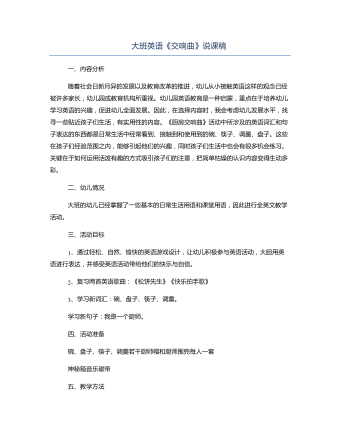
大班英语《交响曲》说课稿
二、幼儿情况大班的幼儿已经掌握了一些基本的日常生活用语和课堂用语,因此进行全英文教学活动。三、活动目标1、通过轻松、自然、愉快的英语游戏设计,让幼儿积极参与英语活动,大胆用英语进行表达,并感受英语活动带给他们的快乐与自信。2、复习两首英语歌曲:《松饼先生》《快乐拍手歌》3、学习新词汇:碗、盘子、筷子、调羹。学习新句子:我是一个厨师。四、活动准备碗、盘子、筷子、调羹若干厨师帽和厨师围兜每人一套神秘箱音乐磁带五、教学方法1、游戏法孩子生来是好动的,是以游戏为生命的。游戏化教学有着其他活动不能代替的功能和价值。英语与游戏的结合,能充分激起幼儿学英语的兴趣,密切师幼关系,尤其能提供给幼儿轻松自然愉快运用英语的机会。2、直接法全英文教学形式,直接培养幼儿简单英语思维以及表达习惯。3、重复法不断重复单词与句型,刺激幼儿印象,强化巩固记忆。4、赏识教育法鼓励与表扬幼儿的每一次进步,培养孩子们的兴趣,并帮助他们树立信心。六、活动过程1、问候

新人教版高中英语必修3Unit 5 The Value of Money-Listening &Speaking&Talking教学设计
4. A:We’d like to have someone to say a word at the beginning to welcome the group.B:↙Who?A:We thought that you or Dr.Johnson might do it.B用降调说Who,其意思是问,对方想让谁在开场时致欢迎词。Step 6 Pronunciation---Practice1. Listen to the short conversation and mark the intonation with ↗, ↙ or ↙, ↗. Then discuss with a partner what they intend to convey by using different intonation.Owner: You know what ?↗ It’s a million-pound bank note↙.Waiter 1: Really ?↗(question)Waiter 2: Really !↙(unbelievable and surprised)Waiter 3: Really ?!↙↗(first question then surprised)2. Listen to the conversations. Underline the parts that are stressed and mark the intonation. Then talk about the implied meanings of the responses with different intonations. Listen again and repeat.1) Henry: It’s a nice suit.Owner: Oh, it’s perfect!↙(The intonation means it is very suitable for Henry.)2) Henry: Well, that’s very kind of you.Owner: Kind, sir ?↗(what you said is not right) No, it’s kind of you. You must come whenever you want and have whatever you like. Just having you sit here is a great honour !!↙(welcome you to come again)3)Henry:Well, to be honest, I have none. Oliver:(happily) What luck!(excited) Brother↗, what luck!↙(It means “Didn’t you hear it?”)Henry: Well, it may seem lucky to you but not to me!↗(angry) If this is your idea of some kind of joke, I don’t think it’s very funny. Now if you’ll excuse me, I ought to be on my way.↙(If so, I would leave.)Roderick: Please don’t go↙...(hope Henry can wait for a moment)Part B Viewing and Talking---Describe people’s changing attitudes in a film clipStep 1 Before-listening---Tell the filmYou are going to watch part of the film The Million Pound Bank Note. Look at these photos and guess what happens in the film.

新人教版高中英语必修3Unit 5 The value of money-Reading and Thinking教学设计二
? Could you offer me some kind of work here?? I don’t want your charity, I just want an honest job.? Careless: I landed in Britain by accident.Step 7:Consolidation.? Find Henry? Roderick and Oliver were I .making a bet when they saw Henry, a poor young man. ? Know Henry? About a month ago, Henry was sailing and later he found himself carried out to sea by a strong wind. Fortunately, he 2.was spotted by a ship. And it was the ship that brought him to 3.England? Offer money to Henry ? Oliver and Roderick gave Henry a letter and told him that there was money in it. They 4.persuaded him to accept it, and made him 5.promise that it wouldn't be opened until 2 o'clock.Step 8:Language pointsa large amount of: a large quantity of; a great deal ofe.g. They bought a large amount of furniture before they moved their new house.make a bet: make an arrangement to risk money, etc. on an event of which the result is doubtful.e.g. We made a bet on the result of the match.permit sb to do something: allow somebody to do somethinge.g. My mother doesn’t permit me to ride in the street after it rained.by accident: as a result of chancee.g. I only found it by accident.stare at: look at somebody or something with the eyes wide open in a fixed gaze( in astonishment, wonder, fear, etc)to be honest: to tell you the truth; to be franke.g. To be honest, I don’t think we have a chance of winning.Step7 Homework:What do you think will happen to Henry? Will the bank-note help him or get him into trouble?

新人教版高中英语必修3Unit 5 The Value of Money-Reading and Thinking教学设计一
Everybody wants to get wealth.In today’s material world,making money or becoming wealthy symbolizes a person’s success and capability. Many people just make every effort, pay any price to attain greater wealth. With money,they can buy nice, large apartments in nice neighborhood. With money they can own luxurious cars. Wealth seems to bring all happiness in life.But is wealth the only road to happiness? Not really. There are many things in the world, which are beyond the means of money, such as friendship, love, health and knowledge. People are so preoccupied with struggling for money that they have no time or would not take the time to form or maintain friendship. What happiness can they feel living as lonely miserable creatures without love or friends in the world even if they accumulate tremendous wealth?In my opinion, people can’t do anything without money, but money is not everything. What money will bring you depends on your personal belief and goal in life. If you are kind enough to help others, especially the poor, money is a good thing to you. With it, you can do much more for the benefit of people and your country, and it will add to your own happiness. If you want money just for your own needs, you’ll never be satisfied or happy. In a word,you should have money spent for more people. Only then can money be the source of your happiness.Step 8 Homework4 students in a group, one acts Roderick, one Oliver, one servant and the fourth one acts Henry Adams, then listen to the tape, pay more attention to the difference between American English and British English in pronunciation, stress, tone.

新人教版高中英语必修3Unit 5 the value of money-Reading For Writing教学设计一
【参考范文】Narrator:(Henry is smiling as he leaves the restaurant. As he is walking down the street, he sees a sign for a place that cuts hair. He decides to get it cut. )H=Henry;B=Barber;R=rude manH:Good afternoon, I'd like to get a cut, if I may. (The barber looks at Henry's hair and continues cutting another man's hair. )Er, I'd really like a haircut. As you can see it's much too long. B:(in a rude manner) Yes, I can see that. Indeed, I can. H:Fine, well I'll have a seat then. (He sits in one of the barber's chairs. The barber turns to look at Henry. )B:It's quite expensive here, you know!Are you sure you can afford it?H:Yes. I think so. (In comes the rude man. )R:Hey you there. I need a haircut quickly. Can you do me straightaway?B:All right, then, get in the chair and I'll see what I can do. R:Thank you. (sits down in one of the barber's chairs)H:Excuse me, but I was here first. Aren't you going to do my hair first?B:This man's in a hurry. H:Well so am I!I insist that you cut my hair first. B:OK, but I'll have to be quick. This gentleman is waiting. H:Thank you. (They both become quiet. After his hair is cut, the barber tells Henry how much he must pay. Henry shows the barber the bank note. )B:Why, Mr . . . (looks shocked)H:Adams. Henry Adams. I'm sorry, I don't have any change. R:You're that Mr Adams! Well,I'm glad I waited or I might never have known it was you. B:Why, Mr Adams, please don't worry!(wearing a big smile) Nothing to worry about!Nothing at all!Please come back any time, even if you only need too little hairs cut!It will be my honour to serve you!

新人教版高中英语必修3Unit 5 The Value of Money- Discovering Useful Structure教学设计
Step 3 Meaning1. 过去将来时表示从过去某一时间来看将要发生的动作或存在的状态, 常用在宾语从句中。一般由“would/should +动词原形”构成。She hoped that they would meet again someday. 她希望将来有一天他们能再见面。2. was/were going to+动词原形: 表示过去将要发生或很有可能发生的动作, 常用于口语中, 表示预言、意图或者打算等。He was going to start work the following week. 他打算下星期开始工作。3. was/were about to do: 常用来表示即将发生的动作, “刚要/正要做……”。注意该结构不与任何时间状语连用。I felt that something terrible was about to happen. 我感到某种可怕的事情即将发生。4.was/were to do: 表示“曾计划做某事”, 如果表示“本来计划做某事, 动作没实现”, 则需用 “was/were to have done”。She said she was to have told me about the accident. 她说她本来想告诉我关于事故的事。5.Start, go, come, leave, see, meet等动词的过去进行时: 表示就过去某一时刻而言即将发生的动作。She was coming later. 她随后就来。I had just put on my overcoat and was leaving to visit a friend of mine. 我刚穿上外套要去看我的一个朋友。

新人教版高中英语必修3Unit 5 The Value of Money-Listening &Speaking教学设计
Step 4: Listen again and decide if the following statements are true (T) or false (F).1 It was the first time Chen Liyan's story was reported. T口 F口2 Chen found 10,000 yuan in a small plastic bag in Taiyuan railway station口 F口3 Wang Zheng apologized to Chen because he couldn't offer her more money. T口 F口4 Chen took out a large loan to cure her daughter, T口 F口5 Wang set up a fundraising website for Chen's daughter after Chen told him about her situation. T口 F口Step 5:After listening, discuss the questions.1 What kind of person do you think Chen Liyan is?Chen Liyan is generous and honest because she returned a large sum of money to the owner.2 Did Chen return the money because she didn't need it?No. She returned the money because it was the right thing to do. Evidence for this is that she refused to accept the reward money because she felt that it had not been earned. 3 Is it common for people to do what Chen did?It depends on the culture. In some countries it is quite common to return money that has been found. In other countries, people believe "Finders are keepers!" 4 How did Wang Zheng feel about the return of his money?He must have been very happy and relieved to have gotten his money back. We know this because he thanked Chen repeatedly and even offered her a reward.5 Why did Ma Dongbao tell Wang about Chen's family?He must have had great sympathy for Chen and her daughter and wanted to help them.'We know this because he arranged help for them. 6 How did the news reporter feel about Chen's actions?The news reporter felt that it showed that money wasn't the most important thing in life. We know this because the reporter told us that this is what Chen believes. and then said, “that's a great attitude to take."

新人教版高中英语必修3Unit 5 The Value of Money-Reading for Writing教学设计二
2. 您能看到, 我头发太长了。You can see that my hair is much too long.3. 无论什么时候, 只要您想回来就回来。Please come back whenever you want.4. 您仅有很少的头发要理! You only have too little hair to cut !5. 为您服务是我的荣幸!It is my honour to serve you!Step 9 Writing(Henry is walking down the street when he sees a sign for a place that cuts hair. He decides to have it cut. )H=Henry B=BarberH: Good afternoon, I’d like to have my hair cut, if I may. (The barber looks at Henry’s hair and continues cutting another man’s hair. ) Er, I’d really like a haircut. As you can see it’s much too long. B: (in a rude manner) Yes, I can see that. Indeed, I can. H: Fine, well, I’ll have a seat then. (He sits in one of the barber’s chairs. The barber turns to look at Henry. )B: It’s quite expensive here, you know! Are you sure you can afford it?H: Yes. I think so. (After his hair is cut, the barber tells Henry how much he must pay. Henry shows the barber the bank note. )B: Why Mr. . . (looks shocked)H: Adams. Henry Adams. I’m sorry. I don’t have any change. B: Please don’t worry! (wearing a big smile) Nothing to worry about! Nothing at all! Please come back whenever you want, even if you only have too little hair to cut! It will be my honour to serve you!Step 10 Pair workExchange drafts with a partner. Use this checklist to help your partner revise his/her draft.1. Are all the elements of a play included and in good order ?2. Do the character use suitable language ?3. Are the stage directions clear and useful ?4. Is the plot clear and exciting enough ?

新人教版高中英语必修3Unit 5 The Value of Money-Discovering Useful Structures导学案
4.They were going to find someone to take part in their bet when they saw Henry walking on the street outside.[归纳]1.过去将来时的基本构成和用法过去将来时由“would+动词原形”构成,主要表示从过去某一时间来看将要发生的动作(尤其用于宾语从句中),还可以表示过去的动作习惯或倾向。Jeff knew he would be tired the next day.He promised that he would not open the letter until 2 o'clock.She said that she wouldn't do that again.2.表示过去将来时的其他表达法(1)was/were going to+动词原形:该结构有两个主要用法,一是表示过去的打算,二是表示在过去看来有迹象表明将要发生某事。I thought it was going to rain.(2)was/were to+动词原形:主要表示过去按计划或安排要做的事情。She said she was to get married next month.(3)was/were about to+动词原形:表示在过去看来即将要发生的动作,由于本身已含有“即将”的意味,所以不再与表示具体的将来时间状语连用。I was about to go to bed when the phone rang.(4)was/were+现在分词:表示在过去看来即将发生的动作,通常可用于该结构中的动词是come,go,leave,arrive,begin,start,stop,close,open,die,join,borrow,buy等瞬间动词。Jack said he was leaving tomorrow.
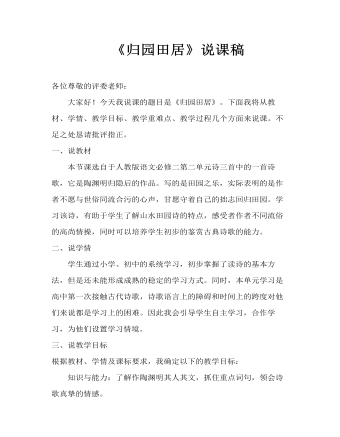
高中语文人教版必修二《归园田居》说课稿
一、说教材本节课选自于人教版语文必修二第二单元诗三首中的一首诗歌,它是陶渊明归隐后的作品。写的是田园之乐,实际表明的是作者不愿与世俗同流合污的心声,甘愿守着自己的拙志回归田园。学习该诗,有助于学生了解山水田园诗的特点,感受者作者不同流俗的高尚情操,同时可以培养学生初步的鉴赏古典诗歌的能力。
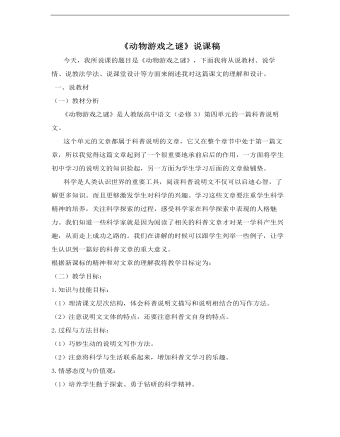
高中语文人教版必修三《动物游戏之谜》说课稿
科学是人类认识世界的重要工具,阅读科普说明文不仅可以启迪心智,了解更多知识。而且更够激发学生对科学的兴趣。学习这些文章要注重学生科学精神的培养,关注科学探索的过程,感受科学家在科学探索中表现的人格魅力。我们知道一些科学家就是因为阅读了相关的科普文章才对某一学科产生兴趣,从而走上成功之路的。我们在讲解的时候可以跟学生列举一些例子,让学生认识到一篇好的科普文章的重大意义。
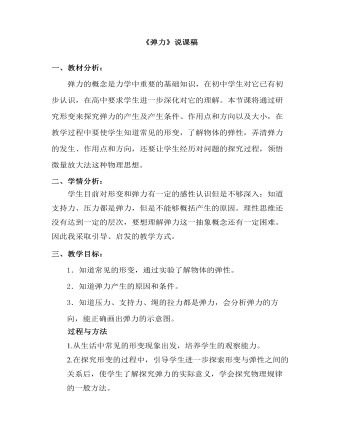
高中物理人教版必修一《弹力》说课稿
二、学情分析:学生目前对形变和弹力有一定的感性认识但是不够深入;知道支持力、压力都是弹力,但是不能够概括产生的原因。理性思维还没有达到一定的层次,要想理解弹力这一抽象概念还有一定困难。因此我采取引导、启发的教学方式。

人教版高中语文必修5《说“木叶”》教案
【教学目标】Ⅰ、学习理解诗歌语言的暗示性特质。Ⅱ、根据诗歌语言的特质,进行迁移,领略诗歌的精妙之处,给同学如何鉴赏诗歌提供实感。㈠、导入:各位同学,有个成语叫"一字千金"。对我而言,第一次领略到一个字的分量,是在小学三年级的时候,一次作文评析课上。当时我对自己的文章充满了期待,希望能得到老师的赞赏。记得老师进来后的第一句话是"有一篇文章,我就冲它用了一个字,我给它打95分。打这样的高分,对我来说,是极为难得的。"同学都充满了好奇,老师接着说"这个字就是一个'悟'字。我们的同学都说我学到了,我明白了,我懂得了一个道理,而这位同学却用了一个'悟'字,难能可贵。"这篇文章不是我的,在羡慕的同时,一个字在文章中的分量就深深的刻在了我的心上。文学作品中,一个字精妙与否,足以决定作品是流光溢彩,还是黯然失色。尤其是我们的古典诗词,用简短的几个字,造就的却是丰富的情感与博大的意境。读后满口余香,却是妙处难与君说。这跟诗歌的语言是密不可分的。今天,我们就通过《说"木叶"》一文,对中国古典诗词语言特质作一番探幽。
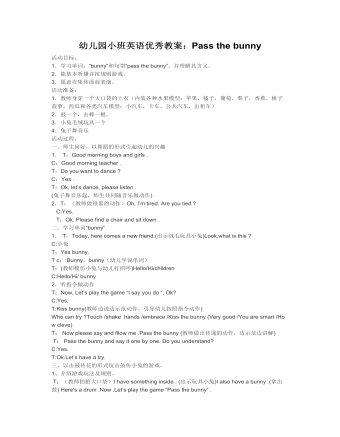
幼儿园小班英语优秀教案:Pass the bunny
2.能基本听懂并按规则游戏。 3.愿意在集体面前表演。 活动准备: 1.教师身穿一个大口袋的上衣(内装各种水果模型:苹果,橘子,葡萄,梨子,香蕉,桃子菠萝,西瓜和各类汽车模型:小汽车,卡车。公共汽车,出租车) 2.鼓一个,击棒一根。 3.小兔毛绒玩具一个 4.兔子舞音乐 活动过程: 一.师生问好,以舞蹈的形式引起幼儿的兴趣 1. T:Good morning boys and girls . C:Good morning teacher .T:Do you want to dance ?C:Yes . T:Ok, let’s dance, please listen .(兔子舞音乐起,师生共同随音乐做动作) 2.T:(教师做很累的动作)Oh, I’m tired. Are you tied ? C:Yes. T:Ok. Please find a chair and sit down .
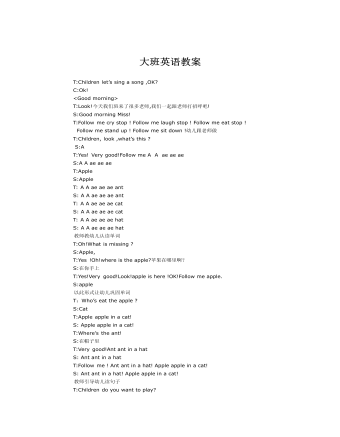
英语公开课教案
<Good morning> T:Look!今天我们班来了很多老师,我们一起跟老师打招呼吧! S:Goodmorning Miss! T:Follow mecry stop ! Follow me laugh stop ! Follow me eat stop ! Follow me stand up ! Follow me sit down !幼儿跟老师做 T:Children,look ,what’s this ? S:A T:Yes! Verygood!Follow me A A ae ae ae S:A A ae aeae T:Apple S:Apple T: A A ae aeae ant S: A A ae aeae ant T: A A ae aeae cat S: A A ae aeae cat T: A A ae aeae hat S: A A ae aeae hat
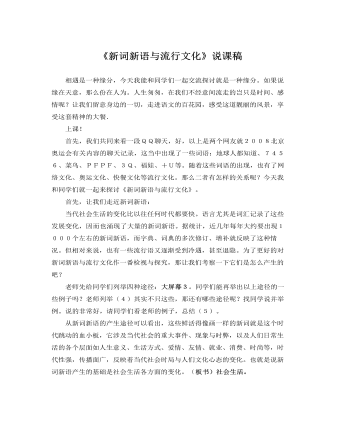
人教版高中语文必修1《新词新语与流行文化》说课稿
当代社会生活的变化比以往任何时代都要快。语言尤其是词汇记录了这些发展变化,因而也涌现了大量的新词新语。据统计,近几年每年大约要出现1000个左右的新词新语,而字典、词典的多次修订、增补就反映了这种情况。但相对来说,也有一些流行语又逐渐受到冷遇,甚至退隐。为了更好的对新词新语与流行文化作一番检视与探究,那让我们考察一下它们是怎么产生的吧?老师先给同学们列举四种途径:大屏幕3。同学们能再举出以上途径的一些例子吗?老师列举(4)其实不只这些,那还有哪些途径呢?找同学说并举例。说的非常好,请同学们看老师的例子,总结(5)。从新词新语的产生途径可以看出,这些鲜活得像画一样的新词就是这个时代跳动的血小板,它涉及当代社会的重大事件、现象与时弊,以及人们日常生活的各个层面如人生意义、生活方式、爱情、友情、就业、消费、时尚等,时代性强,传播面广,反映着当代社会时局与人们文化心态的变化。
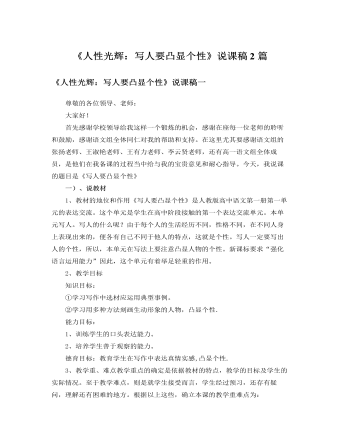
人教版高中语文必修1《人性光辉:写人要凸显个性》说课稿2篇
人教版新课标教材必修一的“表达交流”部分,有一个专题是“人性的光辉——写人要凸显个性”。其中的“写法借鉴”部分列举了两则人物描写实例,并归纳出人物描写的几个要点。其训练的思路和方法是很明显的,但所列举的人物描写的实例却不够典型。而必修一第三单元正好是学习写人记事散文,其中的两篇自读课文《记梁任公先生的一次演讲》《金岳霖先生》又是写人记事非常典型的文章,故而我尝试将这两篇文章作为实例和。写人要凸显个性。写作指导结合起来教学。这样设计还有一个目的,那就是解决课程改革中教学内容多而课时紧张的矛盾,提高课堂教学效率。师:今天,我们一起来学习“写人要凸显个性”。这两堂课分四个步骤来完成:一、先学习教材中关于写人方法的介绍,约15分钟;二、快速阅读第三单元的《记梁任公先生的一次演讲》和《金岳霖先生》两篇文章,具体感受其写人的方法,约30分钟;
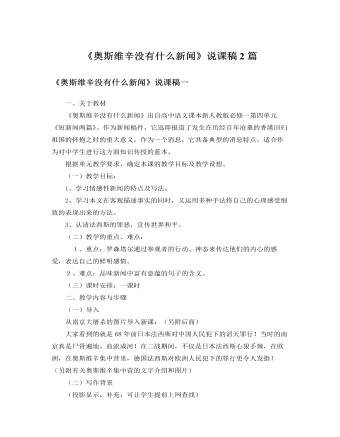
人教版高中语文必修1《奥斯维辛没有什么新闻》说课稿2篇
第11段很短,只点出了这是“在妇女身上搞不育试验的地方”,但在最末又加了一句“否则他会羞红了脸的”,这是为什么?那肯定是一个极为肮脏,极为残酷的地方。据资料记载:当时的希特勒制定一项令所有被征服或占领国家的民族充当奴隶并且逐渐消亡的隐密性种族灭绝计划——高效率、大规模的强制绝育。为此,数以百计的纳粹医生、教授、专家甚至护士,在行政管理专家的通力合作下,相继提出了几十种绝育方法,十余种实施方案,并且在奥斯维辛、拉芬斯布吕克、布亨瓦尔特、达豪等十多个大型集中营内对数以万计的犹太、吉普赛囚犯、因从事抵抗运动而被捕的政治犯和男女战俘进行了残酷的手术试验,造成他们大量死亡或者终身残疾、终身不育。这样残酷的毫无人性的手段,任谁也不愿看到。

人教版高中语文必修1《黄河九曲:写事要有点波澜》说课稿
二、说学生本届高一学生经过了三年初中课改,在心理上,他们渴望表现的欲望和自主探究的欲望比较强烈,对有兴趣的知识表现出高度地热情,并具有一定的团结协作能力,但还是应该正视一个并不乐观的现实——在写作方面,学生知识还停留在简单的记叙及表达方式综合运用上,至于巧妙构思、谋篇布局很是空白。即便已经经过高中一个学期的学习,但还是有大部分学生依然基础较为薄弱,甚至出现不知从何下笔的现象。三、说教法与学法“老师搭台,学生唱戏”1、教法:本课将安排两课时(一课时学习一课时练笔),采用 PPT 多媒体课件教学,尝试用角色扮演法、图片展示法和多媒体教学等方法,教学中应该重视学生的参与性和探究性。2、学法:学生应该充分利用多角度创设的学习情境来激发自身学习的兴趣和热情,分组讨论,小组互助等形式让学生积极自主参与、进行问题探究学习。理论依据:建构主义理论“学生是学习的中心”的阐释,教师应该做学生主动建构意义的帮助者、促进者。
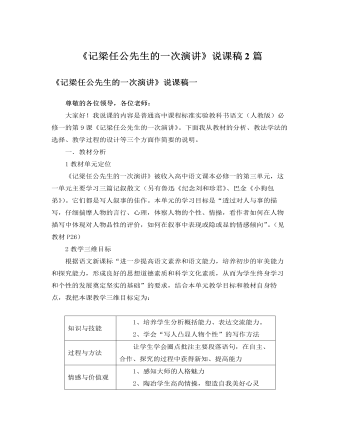
人教版高中语文必修1《记梁任公先生的一次演讲》说课稿2篇
6、思考:作者心目中的梁启超是什么形象呢?明确:梁任公是位有学问,有文采,有热心肠的学者。由学生找出文中体现梁启超学问、文采的句子。教师展示幻灯。补充介绍:文采不仅体现在书面,也能从流畅的口语表达中反映。《箜篌引》短短十六字蕴涵了什么故事,竟让梁启超描述得生动感人以至作者多年后还印象深刻呢?《箜篌引》出自《汉乐府诗》,记叙了一个悲惨壮烈的故事:朝鲜水兵在水边撑船巡逻时,见一个白发狂夫提壶渡江,被水冲走。他的妻子劝阻不及,悲痛欲绝,取出箜篌对着江水反复吟唱。一曲终了,她也投河随夫而去。朝鲜水兵回家向自己的妻子丽玉讲述了这个故事,丽玉援引故事中的悲情,创作了这首歌曲,听过的人无不动容。7、朗读训练了解《箜篌引》的故事后,请各小组选派代表朗读,由学生点评,体会梁启超演讲技巧的高超。8、文中说梁任公是个热心肠的人,你同意吗?通过结尾段的“热心肠”转入对其人格的分析。